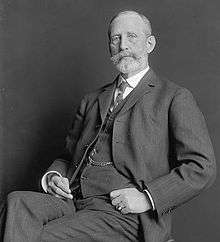Henry Wilbur Palmer

Henry Wilbur Palmer (July 10, 1839 – February 15, 1913) was a Republican member of the U.S. House of Representatives from Pennsylvania.
Henry W. Palmer was born in Clifford Township, Pennsylvania. He attended Wyoming Seminary in Kingston, Pennsylvania, and Fort Edward Institute in Fort Edward, New York. He graduated from the National Law School in Poughkeepsie, New York, in 1860.
In 1861 he was admitted to the bar in Peekskill, New York, and in Wilkes-Barre, Pennsylvania, in 1861. He served as prothonotary’s clerk in 1861, and served in the pay department of the Union Army at New Orleans in 1862 and 1863. He was a member of the constitutional convention of Pennsylvania in 1872 and 1873, and served as attorney general of the State in 1879 through 1883.
Palmer was elected as a Republican to the Fifty-seventh, Fifty-eighth, and Fifty-ninth Congresses. He was one of the managers appointed by the United States House of Representatives in 1905 to conduct the impeachment proceedings against Charles Swayne, judge of the United States Court for the Northern District of Florida. He was again elected to the Sixty-first Congress. He practiced law until his death in Wilkes-Barre. Interment in Hollenback Cemetery.
Sources
- United States Congress. "Henry W. Palmer (id: P000040)". Biographical Directory of the United States Congress.
- The Political Graveyard
| United States House of Representatives | ||
|---|---|---|
| Preceded by Stanley W. Davenport |
Member of the U.S. House of Representatives from Pennsylvania's 12th congressional district 1901–1903 |
Succeeded by George R. Patterson |
| Preceded by William Connell |
Member of the U.S. House of Representatives from Pennsylvania's 11th congressional district 1903–1907 |
Succeeded by John T. Lenahan |
| Preceded by John T. Lenahan |
Member of the U.S. House of Representatives from Pennsylvania's 11th congressional district 1909–1911 |
Succeeded by Charles C. Bowman |
| Legal offices | ||
| Preceded by George Lear |
Attorney General of Pennsylvania 1879–1883 |
Succeeded by Lewis C. Cassidy |
